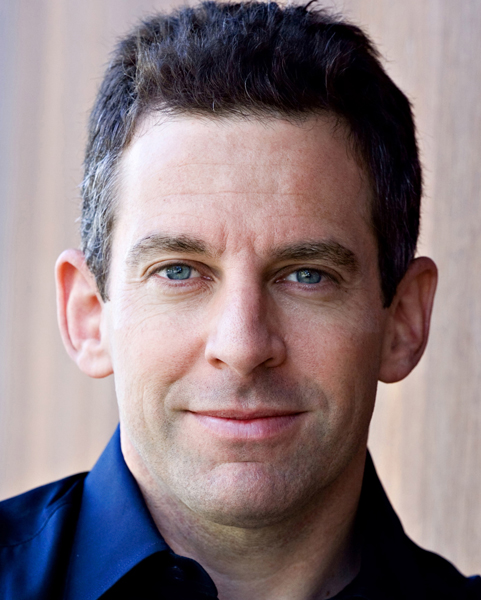
In Sam Harris’ new book, “Waking Up: A Guide to Spirituality Without Religion,” the usually outspoken critic of religion describes how spirituality not only can, but must, be divorced from religion if the human mind is to reach its full potential. Photo courtesy of Simon & Schuster Publicity
(RNS) Uber-atheist Sam Harris is getting all spiritual.
In his new book, “Waking Up: A Guide to Spirituality Without Religion,” the usually outspoken critic of religion describes how spirituality can and must be divorced from religion if the human mind is to reach its full potential.
“Our world is dangerously riven by religious doctrines that all educated people should condemn,” he writes in the book, but adds: “There is more to understanding the human condition than science and secular culture generally admit.”
The prescription, Harris holds, is Buddhist-based mindfulness meditation. A Stanford-trained neuroscientist, Harris is a long-time practitioner of Buddhist meditation. He said everyone can, through meditation, achieve a “shift in perspective” by moving beyond a sense of self to reach an enlightening sense of connectedness — a spirituality.
Spirituality “is a name for all of the deliberate efforts people can make to cut through the illusion of the self, the illusion that there is a thinker in addition to the thoughts, or an ego as it is often called,” Harris, 47, said in a telephone interview. “Self-transcendence is the foundation of what I am calling spirituality.”
But, he warns, conflating mindfulness meditation or spirituality with anything supernatural — from the forgiving love of a Christian God to the cosmology of Buddhism — is a path to nowhere.
“My goal,” he writes in the book, “is to pluck the diamond from the esoteric dunghill of religion.”
“Waking Up” has been well-received by the general press. Writing in The New York Times, columnist Frank Bruni described it as, “so entirely of this moment, so keenly in touch with the growing number of Americans who are willing to say that they do not find the succor they crave, or a truth that makes sense to them, in organized religion.”
But the book’s real success rests with Harris’ core audience: atheists. Many of his erstwhile followers credit Harris with launching New Atheism – an aggressive form of non-belief that calls for the eradication of religion – with his 2004 book “The End of Faith: Religion, Terror and the Future of Reason,” and have little patience for the trappings of faith.
“I know for a fact that many atheists are put off by Sam Harris’ word choices,” like “spirituality” and “transcendence,” said Dave Muscato, director of communications for American Atheists. He said some atheists will find “a connection to Sam Harris’ spirituality while others (will) see no need for it.”
Harris is aware of the problem of reaching atheists with spiritual language — he addresses it in the book — but he is adamant that a failure to understand spiritual experiences outside the framework of faith forms “the hole” in secularism.
“There is no modern, scientific, skeptical context in which to unpack spiritual experiences,” Harris said. “People know they have had these experiences and then they hear atheists or skeptics discount them. There is no shelf in the atheist library for these deeply transformative experiences and they are left with absurd religious stories and doctrines by which to understand them.”
But there is plenty in “Waking Up” that will delight Harris’ most militant atheist readers. The world’s religions, he writes, are “mere intellectual ruins” and its objects of devotion are “epileptics, schizophrenics, or frauds.”
“But I now understood,” he writes, “that important psychological truths can be found in the rubble.”
Harris is not the first atheist to suggest nonbelievers should mine the world’s religious traditions for wisdom or beneficial practices. Philosopher Alain de Botton and humanist Chris Stedman have written books that explore the possibilities, and nonbelievers have been flocking to so-called “atheist churches” such as the Sunday Assembly.
Harris’ description of his own spiritual experiences achieved through meditation shares common ground with those of religious people. In the most eyebrow-raising scene in the book, he describes standing on the edge of the Sea of Galilee — Jesus’ old stomping grounds — losing his sense of self and finding “a blissful stillness that silenced my thoughts.”
“If I were a Christian, I would undoubtedly have interpreted this experience in Christian terms,” he writes — perhaps evidence of the Holy Spirit. “But I am simply someone who is making his best effort to be a rational human being.”
And that is the key difference Harris is after in the book — spiritual experiences are not proof of God, but are proof of the power and complexity of the human mind.
Will that distinction be enough to keep his atheist followers? Peter Boghossian, author of “A Manual for Creating Atheists,” another book that calls for the abandonment of religion, thinks so.
“What Harris is trying to do is say, you can experience these states without making supernatural claims,” he said. “People do have these experiences and you don’t need to believe in angels or reincarnation or to explain them, you don’t need to rely on old ancient books to explain states of consciousness.”
Harris is creating his own opportunities to explain his version of spirituality. He has shunned the usual book tour to stage, at his own expense, a string of fall appearances from Los Angeles to Boston.
YS/AMB END WINSTON






